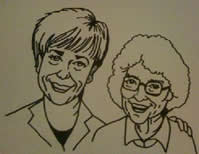As you can imagine, I’m often asked how to convince a loved one who has dementia to move out of a home when she or he has refused. The issue is further complicated when someone is ambulatory, somewhat functional, but safety is a concern. If your loved one refuses to move, it is unlikely that you’ll be able to talk him or her into moving anywhere. It isn’t worth bringing up the subject. The person may become upset and dig his/her heels in deeper. The disease prevents the individual from rationally understanding the situation. While each case is different, here are some basic ideas I have seen work for my clients.
- Once a community has been selected on behalf of your loved one’s best interests, have his/her physician write orders saying that the person should be admitted for general care and management of a medical condition. The move should be presented as a temporary situation that has nothing to do with your loved one’s mental capacity. Remind your loved one that life for all of us is best lived One Day at a Time, and that nothing is ever written in stone. The move is a step, taken with his/her safety in mind. It is not an “end.” Hopefully once the person is settled, s/he will adjust well and forget prior objections.
- Convince the person that the home or apartment is unfit for habitation due to physical problems and have them “temporarily” relocate to the chosen community.
 Chicago Senior Living Advisors Blog
Chicago Senior Living Advisors Blog


 Real-Life Story
Real-Life Story